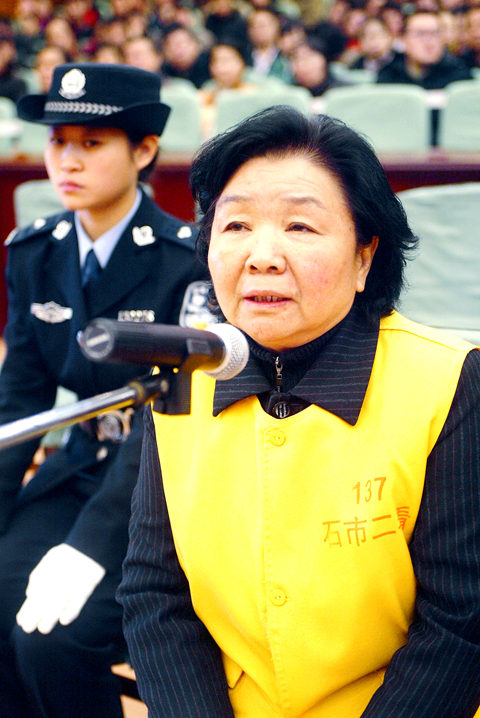“Please forgive us,” a group of Chinese dairy firms said in a New Year text message sent to millions of mobile phone subscribers.
The 22 dairy firms, led by the now-bankrupt Sanlu (三鹿), apologized and asked forgiveness for the contamination of their products by melamine, which killed at least six babies and made 290,000 ill.
Melamine, an industrial compound used in plastic and fertilizer, was added to milk to cheat protein tests.

PHOTO: AP
The chairwoman of Sanlu, Tian Wenhua (田文華), and three other company executives are on trial at a court in northern China for the contamination. Tian is expected to be sentenced to life imprisonment, although the verdict may not be reached for several weeks, the Beijing News said yesterday.
“We are deeply sorry for the harm caused to the children and society,” the text message read. “We sincerely apologize for that and we beg your forgiveness.”
Another 17 people involved in producing, selling, buying and adding melamine in raw milk have gone on trial in the last week.
Sanlu said it discovered the problem and reported it to local authorities in Hebei Province on Aug. 2, just days before the Olympic Games began in Beijing.
But nothing became public until early September, when the New Zealand government said it brought complaints by Sanlu’s partner, Fonterra, to the attention of the Chinese government.
Meanwhile, clusters of babies ill with kidney stones had cropped up in Chinese hospitals.
“If we were in Europe or another country, it wouldn’t be a question of apologies, it would be a question of legal responsibility,” Beijinger Shi Zhiqing said.
Meanwhile, Fonterra has rejected claims the former head of its Chinese joint venture pleaded guilty to charges related to the tainted milk scandal, reports said yesterday.
Tian had “absolutely and unequivocally” pleaded not guilty in a Chinese court to the charges, a Fonterra spokesman told the New Zealand Herald.
The verdicts have yet to be delivered, but Fonterra chief executive Andrew Ferrier said he would be saddened if Tian were convicted, let alone executed.
“She seemed to live and breathe Sanlu,” Ferrier said. “She only wanted the best for Sanlu and it would be very sad if she’s found guilty of any crimes.”
Fonterra, which wrote off its 43 percent shareholding in Sanlu for a loss of NZ$201 million (US$114 million), was not represented at the one-day court hearing.
However, the Fonterra spokesman told the Herald he received assurances about Tian’s not pleading guilty while making inquiries in Asia at Ferrier’s request.
Chinese authorities have made no attempt to press charges against Fonterra. Even so, Ferrier said Fonterra wanted the Sanlu affair resolved before it would re-invest in China.
“It is our intention to re-invest in China at an appropriate time, providing we have enough comfort and control in the supply chain,” Ferrier said.

Rainfall is expected to become more widespread and persistent across central and southern Taiwan over the next few days, with the effects of the weather patterns becoming most prominent between last night and tomorrow, the Central Weather Administration (CWA) said yesterday. Independent meteorologist Daniel Wu (吳德榮) said that based on the latest forecast models of the combination of a low-pressure system and southwesterly winds, rainfall and flooding are expected to continue in central and southern Taiwan from today to Sunday. The CWA also warned of flash floods, thunder and lightning, and strong gusts in these areas, as well as landslides and fallen

WAITING GAME: The US has so far only offered a ‘best rate tariff,’ which officials assume is about 15 percent, the same as Japan, a person familiar with the matter said Taiwan and the US have completed “technical consultations” regarding tariffs and a finalized rate is expected to be released soon, Executive Yuan spokeswoman Michelle Lee (李慧芝) told a news conference yesterday, as a 90-day pause on US President Donald Trump’s “reciprocal” tariffs is set to expire today. The two countries have reached a “certain degree of consensus” on issues such as tariffs, nontariff trade barriers, trade facilitation, supply chain resilience and economic security, Lee said. They also discussed opportunities for cooperation, investment and procurement, she said. A joint statement is still being negotiated and would be released once the US government has made

SOUTH CHINA SEA? The Philippine president spoke of adding more classrooms and power plants, while skipping tensions with China over disputed areas Philippine President Ferdinand Marcos Jr yesterday blasted “useless and crumbling” flood control projects in a state of the nation address that focused on domestic issues after a months-long feud with his vice president. Addressing a joint session of congress after days of rain that left at least 31 dead, Marcos repeated his recent warning that the nation faced a climate change-driven “new normal,” while pledging to investigate publicly funded projects that had failed. “Let’s not pretend, the people know that these projects can breed corruption. Kickbacks ... for the boys,” he said, citing houses that were “swept away” by the floods. “Someone has

‘CRUDE’: The potential countermeasure is in response to South Africa renaming Taiwan’s representative offices and the insistence that it move out of Pretoria Taiwan is considering banning exports of semiconductors to South Africa after the latter unilaterally downgraded and changed the names of Taiwan’s two representative offices, the Ministry of Foreign Affairs (MOFA) said yesterday. On Monday last week, the South African Department of International Relations and Cooperation unilaterally released a statement saying that, as of April 1, the Taipei Liaison Offices in Pretoria and Cape Town had been renamed the “Taipei Commercial Office in Johannesburg” and the “Taipei Commercial Office in Cape Town.” Citing UN General Assembly Resolution 2758, it said that South Africa “recognizes the People’s Republic of China (PRC) as the sole